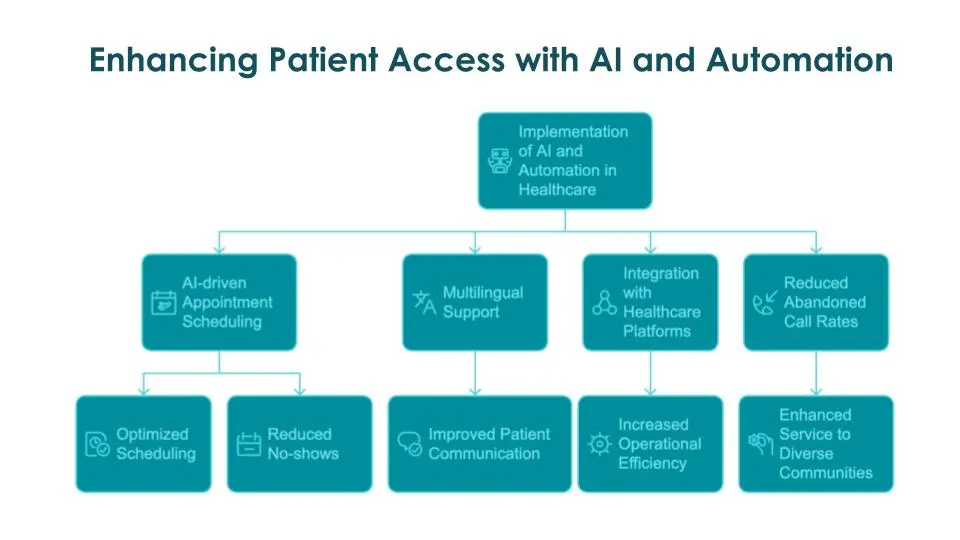How AI Improves Healthcare Scheduling Operations [+ Case Study]

Artificial intelligence (AI) is improving healthcare scheduling operations through routine task automation, data capture accuracy, healthcare staff workflow optimization, and overall operational efficiency improvements. In hospital call centers and front offices, AI-driven tools can handle appointment-related requests faster and more accurately than traditional methods– leading to smoother operations for providers and a better experience for patients.
The Ongoing Reliance on Phones and Traditional Scheduling
Despite the rise of patient portals and apps, most healthcare appointments are still scheduled the old-fashioned way: over the phone. In fact, as of 2024 about 88% of healthcare appointments are scheduled by phone, versus just 2.4% booked online (Source: Invoca)
Patients often prefer speaking to a human for something as personal as healthcare, which is why the average medical appointment call lasts around 8 minutes (Source: MedCity News)
This phone reliance, however, can also lead to inefficiencies, especially when the call volume surpasses your patient scheduling team :
- Long hold times: The average hold time in U.S. healthcare call centers is 4.4 minutes. Many callers grow frustrated – nearly 1 in 6 patients hang up (“call abandon”) before ever reaching a scheduler (Source: Hyro AI)
- Surveys suggest that 60% of callers won’t wait on hold for more than one minute (Source: MedCity News).
- Human errors and inconsistencies: With manual booking, mistakes can happen – a procedure might be scheduled under the wrong department, or a patient’s information might be recorded incorrectly. Such errors create rework and can lead to protocol mix-ups or patient frustration if they have to be called back to fix an appointment.
Why Poor Scheduling Hurts Revenue and Patient Satisfaction
Inefficient scheduling can have real financial and patient experience negative consequences. Unfilled slots or appointment no-shows directly translate to lost revenue. Industry analyses estimate that missed appointments cost the U.S. healthcare system around $150 billion each year (Source: Aegis Dental Network). No-shows are distressingly common, with 25–30% of all medical appointments (and up to 50% in primary care) going unfilled due to patients not showing up. Each open slot is the revenue a healthcare facility can never recoup, and it disrupts operational workflows.
Poor scheduling practices also impact front-end Revenue Cycle Management :
- Delayed or denied payments: If appointments aren’t scheduled correctly, vital information (like insurance pre-authorizations or procedure codes) might be missing, causing billing delays. A simple scheduling error can cascade into slower time-to-payment if claims have to be re-submitted or corrected.
- Lower productivity: When staff have to scramble to fill last-minute gaps or correct scheduling mistakes, it wastes valuable time. For example, a technician idle due to a no-show represents lost productivity that day.
- Patient dissatisfaction: Long wait times on the phone, scheduling mix-ups, or long delays to get an appointment all erode patient confidence. Nearly 49% of patients report being unhappy with the service they receive from healthcare call centers (Source: Hyro AI), and scheduling frustrations are a big reason why. If booking an appointment is too much hassle, patients may switch to a different provider.
- Downstream effects on care: A disorganized scheduling system can lead to delays in care (which may worsen health outcomes) and even affect reimbursement under value-based care models that tie patient satisfaction to payment.
As one industry report warned, health systems that don’t improve their scheduling process “will lose money, have lower patient satisfaction scores… and risk losing patients altogether” (Source: MedCity News). In other words, fixing scheduling isn’t just an operational issue – it’s critical to both the financial health of the organization and the loyalty of patients.
AI in Healthcare Scheduling: Key Technologies and Benefits
Modern AI technologies are stepping in to revolutionize these scheduling challenges. AI in healthcare scheduling comes in a few major forms – notably predictive analytics, and intelligent automation. These tools enhance scheduling operations by accelerating tasks, improving accuracy, and expanding access. Here are the key applications and how they make a difference:
Predictive Analytics for Smarter Scheduling
Predictive analytics involves using data, statistical models, and machine learning to predict future outcomes. When applied to scheduling, it can greatly optimize resources and reduce wasted time:
- Predicting patient no-shows and cancellations: AI models can analyze patient history and other factors to predict which patients are likely to miss their appointments. Armed with these insights, staff can double-book certain time slots (or have a waitlist patient on standby) to ensure empty slots get filled. Predictive algorithms can also trigger extra reminders or follow-ups for patients likely to cancel. This proactive approach works – in one case, implementing a predictive model led to a 70% reduction in predicted appointment cancellations dramatically lowering the no-show rate.
- Forecasting staffing needs: Call volume and appointment requests fluctuate. Predictive analytics can forecast busy call times or peak appointment seasons (say, flu shot season) and help managers schedule the right number of staff at the right times. This ensures call centers are not over- or under-staffed, which saves labor costs while maintaining service quality.
With predictive analytics, healthcare organizations move from reactive scheduling (“dealing with no-shows after they happen”) to proactive scheduling (“preventing no-shows and bottlenecks before they happen”). The result is a more efficient, optimized schedule that benefits both the provider (more consistent throughput) and the patient (more reliable appointment times).
Intelligent Automation and Workflow Integration
Intelligent automation refers to AI systems and robotics that carry out repetitive tasks and decision-making processes automatically. In scheduling operations, intelligent automation works behind the scenes to streamline workflows:
- Automated appointment confirmations and reminders: AI-driven systems can automatically send patients confirmation texts or emails when an appointment is booked, and follow up with reminders as the date approaches. This happens without any staff effort and has been proven to reduce no-shows by keeping appointments top-of-mind for patients.
- Smart rescheduling and waitlist management: When a cancellation does occur, automated algorithms can instantly offer that open slot to the next waiting patient (via an automated text, for example). Instead of front-office staff calling down a list, the system might fill cancellations within minutes. This quick turnaround keeps the schedule full and revenue on track.
- Insurance and eligibility checks: Intelligent bots can verify a patient’s insurance eligibility or referral status during the scheduling process. For instance, as soon as an appointment is set, an automated workflow might cross-check the insurance details on file, and if there’s an issue (like the policy needing an authorization), it can flag it or even initiate the authorization process. By catching these requirements upfront, it prevents billing surprises later – speeding up the revenue cycle.
Handling routine tasks and upkeep using intelligent automation lets human staff focus on more high-value activities – like speaking with a complex patient or solving an unusual scheduling challenge. The end result is a more reliable and efficient scheduling workflow, with fewer chances for human slip-ups and a faster path from appointment booking to billing.
Case in Point: Pax Fidelity – AI that Improves Scheduling Accuracy
One illustrative example of AI in action is Pax Fidelity – an AI-powered solution designed specifically to make scheduling more reliable. Pax Fidelity uses advanced natural language processing to minimize protocol errors during the scheduling process, essentially serving as a smart safety net for booking complex procedures.
What does Pax Fidelity do?
In many healthcare settings (like diagnostic imaging centers or specialty clinics), scheduling an appointment isn’t as simple as picking a time slot – staff also must select the correct protocol or service type from a complicated list. For instance, if a physician orders a certain MRI for a patient, the scheduler must choose the precise MRI protocol (sequence of images, with or without contrast, etc.) that matches that order. With dozens or hundreds of protocols in a knowledge base, it’s easy for human schedulers to pick the wrong one or waste time searching for the right match.
Pax Fidelity tackles this problem by automating protocol identification. It reads the physician’s order or listens to what the patient needs, and then NLP algorithms instantly match it to the appropriate protocol in the system. The AI effectively “understands” the request and applies the correct tags and codes to the appointment. This yields several benefits:
- Fewer errors: Pax Fidelity reduces the risk of patients showing up for an imaging exam only to find it was scheduled incorrectly. Minimizing these protocol errors improves patient safety and satisfaction (the patient gets the correct test) and prevents revenue loss from having to redo scans.
- Faster scheduling: Previously, an agent might spend several minutes flipping through a binder or software menus to find the correct exam code. Pax Fidelity does it in seconds, making the booking process much quicker. An imaging center that implemented Pax Fidelity was able to increase its appointment scheduling throughput significantly – their agents’ calls per hour rose by about 16% (from 6.57 to 7.61 calls/hour) after the AI tool took over protocol selection. Appointments scheduled per hour also jumped ~15% (from 2.16 to 2.50), meaning staff could handle more bookings in the same amount of time.
- Consistency and training: New staff typically need a lot of training to memorize protocols. Pax Fidelity’s AI guidance standardizes the process, so even less-experienced schedulers can book correctly by relying on the AI’s recommendations. This leads to more consistent service and reduces the dependency on individual expert knowledge.
- Better downstream revenue cycle impact: Because the AI is effectively doing some of the “coding” work during scheduling (assigning the proper procedure codes/protocols), claims can be processed faster and with fewer errors. One case noted that automating protocol selection accelerated time-to-pay and minimized human errors (with substantial cost savings from avoiding coding mistakes).
CCD Health’s Pax Fidelity is just one example that shows how combining NLP and intelligent automation can dramatically improve scheduling reliability. It illustrates a broader point: AI solutions can target niche but critical pain points in healthcare operations – like choosing the correct protocol – and solve them at scale with super-human accuracy.
Embracing AI for Better Scheduling and Patient Access
Healthcare organizations are discovering that AI-driven scheduling is not just about convenience – it’s about building a more resilient, efficient operation that benefits both the bottom line and patient experience.
Automating repetitive scheduling tasks, predicting and preventing no-shows, and assisting staff with intelligent decision support, frees up specialized healthcare schedulers to focus on what they do best: proactively scheduling appointments and supporting patients with empathy and quality while handling complex coordination when needed. The result is a win-win: patients get quicker access and smoother service, while providers capture revenue more effectively and reduce administrative overhead.
Ready to modernize your healthcare scheduling? AI can help transform your call center and front office operations. To learn more about improving patient scheduling and front-office operations, visit our healthcare call center solutions page – and discover how technology can elevate your patient access and revenue cycle outcomes.





